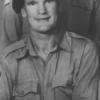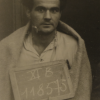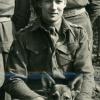Dicky Spender was already a published poet held in high regard when, as a platoon commander in C Company of 2 Para Bn, he was killed assaulting German positions in Tunisia at the age of 21. He was once referred to in the Daily Telegraph as the Rupert Brooke of the Second World War and his poems were published by Sidgwick and Jackson in 3 books:
Laughing Blood (1942) Parachute Battalion; last poems from England and Tunisia (1943) The Collected Poems (1944)Many of his poems were also published in newspapers and periodicals including Punch, Country Life, John O’ London’s Weekly, The Observer and the Times Literary Supplement.
Six of Spender’s poems are connected to his training and service with The Parachute Regiment.
It is presumed that the first of these was written before a balloon jump (‘All my world has suddenly gone quiet’) on his parachute training course conducted at Ringway (and the nearby drop zone at Tatton Park) in 1942; the course comprised of two balloon jumps and five jumps from converted Whitley bombers. Successive generations of Paras can relate to this poem since a balloon jump formed part of the Basic Parachute Course until the 1990s.
Before the First Parachute Descent
All my world has suddenly gone quiet Like a railway carriage as it draws into a station; Conversation fails, laughter dies, And the turning of pages and the striking of matches cease. All life is lapsed into nervous consciousness, Frozen, like blades of grass in blocks of ice, Except where one small persistent voice in the corner Compares with the questioning silence- With the situation of an electric present- My self-opinions, pride and confidence of an untried past.The growing maturity of Spender, pitched into the bloody fighting and privations of Operation Torch, is evidenced in his poetry. A review in Country Life commented “This boy, initiated by the last few months of his life, had found a vision and a wisdom that philosophers and mystics, from their respective approaches, have struggled through a lifetime for.”
It has been suggested that he wrote many poems in Tunisia, however it appears that only five survive: ‘Parachute Battalion’, ‘Heart’s Song’, ‘Tunisian Patrol’, ‘Woman of Sleep’ and ‘Embarkation Leave’, although this poem seems to have been fully sketched out before he left the UK.
Spender wrote the poem ‘The Parachute Battalion’ after the 2nd Battalion’s bloody withdrawal from Oudna in North Africa. It was originally entitled ‘2nd Parachute Battalion’:
Parachute Battalion
Platoon by platoon in formation proudly,
Plane upon plane from the valley’s mouth,
Piercing, with their black-winged squadrons
In powerful flight, the dark hill.
To the wild pipe’s bidding
Last night they danced reel and jig,
Glad for the light in each other’s eyes;
To the wild pipe’s bidding
They have sprung at the unknown shadows of the North.
In what lowering mountain range
Will they make their stand and fight,
And which strange-named stream shall be their bed,
Lying quietly together, strong in death?
Today some silent valley of Tunisia
Shall tremble at their stroke from sky unsheathed,
And, with the night, perhaps some God looking down
With dull, cold eyes, by the near stars, will see
One lonely, grim battalion cut its way
Through agony and death to fame’s high crown,
And wonderingly watch the friendless strength
Of little men, who die that the great Truths shall live.
There have been many advances since Spender’s poems were written over 60 years ago, however human emotion, anatomy and frailty remains unchanged. Any individual who has had to summon the courage to perform a challenging act, whether in combat or some other context, can relate to the emotions expressed in ‘Heart’s Song’ or the perilous temptation to succumb to sleep when suffering from deep fatigue in ‘Woman of Sleep’.
Heart’s Song Sing, Heart, a gay song, Before my knees give way and I grovel; Before I break from my own rein, And the eyes of those that love me See me a coward, and fill with ice, despising! ‘Shut the door behind you tight, There’s no returning. In memory your tears will flow For home’s peace yearning. Pretend you have no mother, No soft-eyed love, Pretend you hate your brother …….O, Christ above……… Forget that hedgerows shelter lambs, That clover stems are sweet, Forget you plucked her cowslips Where other lovers meet.’ ‘Sing, Heart! Quickly, sing loudly Some song to take from me this fear; Take hold of this blade, and drag it, Drag it by chorus and joke, ruthlessly, Before it kills me, from my naked heart. ‘Laugh and sing, laugh and sing, Laugh and sing at anything, Laugh till you close your eyes with mirth. This your only rest on earth- Learn to laugh until you’re blind, And then the Fear that lurks behind Will not be seen, will not be known, Until you meet, unarmed, alone. He who stops laughing and open his eyes Meets Death ten times before he dies.’ Give me a song, Heart to sing loudly; Something bold and without meaning, Like a drum, like a drum, like a drum. Sing quickly, Heart, in a strong voice Before it is too late and my lips tremble, A gay song, careless and free, powerful, blind, Like a swinging, booted, marching-step, Full of unthinking machine-courage, Like a boot, shining and heavy, unfeeling, thick. I looked at Heart, the hot tears through, And saw that Heart was crying too. Woman of Sleep Tempt me not with dalliance, Woman of Sleep Light-footed and swift, to the silk couch of night For here, though your lips and your arms offer love, You are sold to the terrors that hide from the light. I have passed you at dark in the folds of the hills, Heard your low singing, would fain have turned back, But I saw the smooth Treachery kissing your mouth, Death leered through your tresses and clung to your back. Come to me, rather as sister or mother, When I, closing my eyes in the cool mid-day breeze, May imagine the sunshine that splinters through woods And floods the warm meadows I left overseas. Woman of Sleep, though men woo you by starlight, I greet you by sun when you cannot betray, As now as - half dreaming - some African bird Is a sweet thrush that sings to the Tees far away. In sunlight and safety then, let me sink deeper, Hearing the sounds that once made the night good: The cawing of rooks soaring home `cross the sun, The last bark of a dog beyond Ettington wood. But bring not at dusk your breast for my head As when we made love in the years without care, For I have seen men, who had kissed you in darkness, Wake to your cold sister Death’s chilly stare. Both ‘Woman of Sleep’ and the dark poem ‘Tunisian Patrol’ arrived home by surface mail after his death: Tunisian Patrol The Night lies with her body crookedly flung In agony across the sharp hills; By the fitful moon her nostrils are taut, quivering; She is tensed in clod sweat and lonely fear, Giving sudden birth in dark, sly, trodden places To her unlawful issue, blind, hideous Death. Across the pain jerked body of the Night We must go, taking the new-born Death in arms Holding it close, warmly to us, as our own, Giving it new games to play, new toys to tear apart.Compiled by Harvey Grenville
Read More




Latest Comments
There are currently no comments for this content.
Add Comment
In order to add comments you must be registered with ParaData.
If you are currently a ParaData member please login.
If you are not currently a ParaData member but wish to get involved please register.